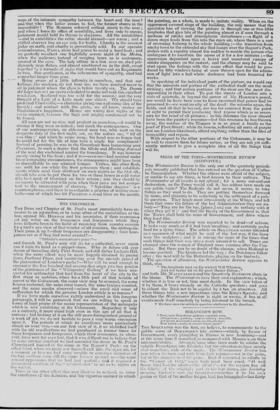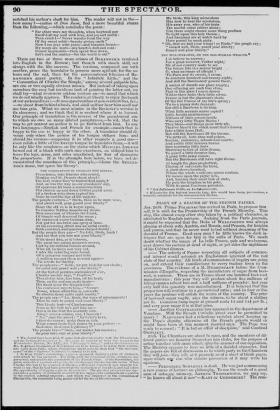BERANGER'S BOW. "Post, acer Nnesthens adduct° constitit arcu, Alta petens
; pariteni : oculos Wining : tetendit. Ast ipsam miserandes:ivem contingere terra Non valuit ; nodos et eineula lenea enpit."
THE SPECTATOR was the first, we believe, to communicate to the public sonic of BERANGER.S late crimes—which, by favour of Government, every ploughboy in France is now humming—and at the same time it remarked, as compared with MooRE's, on their untranslatability. Attempts have since been made to subdue the volatile Frenchman into English; but the adventurers have mostly shot someillin wide of the mark. The Westminster Review has now taken its turn, and with Irish luck rejoices—not in tile prize, but in the number next the prize. Had it restricted its efforts to the "Comet of 1832," every body must have cried, "0 well flown bird elout—ilhe etint ;"—for the version has all the felicite of the original ; and in the hist stanza, like Locksley mending ..fhtbert's shot, the transiator—whether it be his own genius or that of his mother tongue that has triumphed—has fairly notched his author's shaft for him. The reader will not in the— how many ?—cantos of Don Juan, find a more beautiful stanza than the following,—which concludes the poem:
"Far other were my thoughts, when boyhood gay Swell'd all my soul with love, and joy and mirth : Then cried I= Never wander from the way Of thy sweet orbit—beauty-giving earth !' Now I am grey with years—and beauties frown— My songs are mute—my heart is dull and cold : Comet implacable—then speed thee down, Let's end the matter—for the world is old."
There are two or three more crimes of BERANGEWS rendered into English in the Review; but though with much skill, not always with the like success. The versions, compared one with another, prove the translator to possess more aptitude for the solemn and the sad, than for the conversational felicities of BERANGERS gayer poetry. In the "Infinitely Little," and the "Coronation of Charles the Simple," among several palpable hits, are one or two equally obvious misses. Bat instead of taking upon ourselves the easy but invidious task of pointing the latter out, we shall try—what reviewers seldom venture on—to mend that which we do not wholly approve. The reader is at liberty to enjoy his laugh at our awkwardness ;—de non apparenti bus et non existenti bus, &e.; —we shoot from behind a hush, and shall neither hear him scoff nor see him grin. What we most admire in the Reviewer's version is its closeness; and we think that it is weakest where it is loosest. Our principle of translation is the reverse of the paradoxical one to which we owe so many diluted paraphrases,—to wit, that the way to get nearest an author is to go furthest from him. In any two languages—English and French for example—much that is happy in the one is happy in the other. A translator should diverge only when the genius of his tongue obliges him : and should his version—supposing it in other respects a _good one— even relish a little of the foreign tongue he translates from,—it will be only like, the roughness on the statue which MICHAEL ANGELO hewed out of a block with such nice exactness, as obliged him to leave the legs, arms, and sides unpolished, for fear of damaging the proportions. If in the attempts here below, we have not denwnstrated the soundness of this principle,—blame the SPECTATORS muse, but spare his theory*.
THE CORONATION OF CHARLES THE SIMPLE.
Frenchmen, into Rheims who crowd, Montjoy and St. Dennis shout aloud!
The holy cruise they've replenished against
And, as was the way in our grandsires' day, Of sparrows let loose a numerous train The church up and down twitter joyful away.
Of a broken yoke these typical lies Make to curl the lips of his majesty.
The people exclaim—" Birds, than us be more wise,
And guard wells pray guard your liberty."
Since the old us is in vogue again, To Carolus Tertius mounts my strain.
This successor of Charles the Great, Of Simple well deserved the name ; He traversed every German state, Nor got for his brow one sprig of fame.
At his crowning albeit was an awful crush ; Both courtiers and sparrows chirped lustily : But the people they cry—" No folly, Birds, hush !
And see that you lose not your liberty."
With tinsel fine, as it behoves, The great tax-eating monarch moves, Girt by his faithful friends around, Who all, in times not very old, Under the rebel flag were found Of a generous usurper and bold. A million has put them in wind again 'Tis a trifle for fidelity. The people cry—" Birds, we pay high for our chain ; So mind and guard well your liberty."
At the feet of prelates embroidered o'er,
Charles meekly says, " Conliteor."
Theyclothe him, kiss him, oil his head,
Then, as the anthem peals in air—
His hand upon the Gospels laid— , His confessor says to him—" Swear : Rome, whose affair this is, consents To absolve from oaths right readily." The people cry—" Lo, Birds, the ways of governments !
Then be sure to guard well your liberty."
This kingly lout—of Charlemagne
Soon as the belt he's girt him on—
Down in the dust the assembly sees.
King ! cries a soldier, rise, I beseech !
" No," says tbe priest; " by Peter's keys, I thee do crown ; make thou us rich.
.What comes from God, comes by your pastors : — God save, God save legitimacy I " The people cry—" Birds, our master has masters ; So pray take care of your liberty."
* We should have been glad, if space had allowed, to give both the BnaANcEa, and the version of it. We must be content to refer the reader to the Westminster li rho, No. XIX., Art. " 14,ranger's Songs," and to the SPECTATOR No. X.,Iwhere fragments of Ito RANGER are to be found, or to a tiny little volume, late come from Paris, whose dimensions might seem to show that "the G,!rontocracy" of the "Bathm:s" is already brunning to be felt. At King Pcpin's coronation, a pigeon appeared, bearing a phial of ointment, with which he was anointed. The phial, with the remainder of the ointment, was preserved, and used in the coronation of the French kings. At the Revolution, the phial, with other symbols of royalty, was broken an ;1 thrown into the Seine. When Charles Dix was to be crowned at Rhein's, a Monsieur Somebody was brought forward to say, that he had been present at the martyrdom of the phial, and had taken the opportunity of dipping a pin in its cont.mts. The pin thus preserved was dipped into a quantity of ointment, to which it was supposed to communicate a portion of the original celestial unguent ; and which was employed at the coronation of Charles Ill a, the remainder being preserved for the use of his successors,
My birds, this king miraculous Has now to heal the scrofulous.
Hie away you, who of his train
The mortal ennui relieve alone ;
Else there might chance some thing profane To light upon this holy throne ; And hangmen are at watch hard by Here posted by meek piety. Oh, that we had your wings ! ye Birds," the peopb cry ; "Guard well, Birds, guard your liberty; Guard well your liberty."
THE WEE-WEE-WEE, OR THE OLD-WOMAN-WEALTH.* I do believe in sorcery ;
For a great sorcerer, t'other night,' Me of our country made to see The future fate in a mirror bright .
0, what an image of affright! ' 'Tis Paris and its streets, I swear, In nineteen hundred and twenty-eight; And still the Barebonest govern there.
A nation of dwarfs our place supply ; Our offspring are such tiny elves, That in this glass I scarce descry 'Within their holes their little selves.
France is but the phantom's shade Of the fair France of my life's spring ; 'Tis to a pigmy state decayed : But still a Barebone is its king.
What little myriads scarce espied !
Little Jesuits atrabilarious!
Millions of little priests beside Who carry little Virgin Manes ! They bless—and things grow little all; They've bless'd the oldest court that's known Into a little Jesus Hall; But still the Barehones fill the throne.
'Tis petty all, both shop and palace, Science, commerce, schools and courts; And pretty little famines harass Into surrender little forts.
Marching to tick of little drums, To guard a little frontier line, A puny little army comes; But the Barebones still have right divine.
At length the glass prophetical, Closing of sad events the train, A giant shows heretical, Whom the whole world can scarce contain.
He moves upon the pigmy folk, And, braving their small talk of state, He puts the kingdom in his poke, With its great Barebone potentate.
SI
* "Les Infinimens Petits, au La Girontotratie.
't If Louis the Fat had not been the Late, this would have been, per ironicon, a tolerable substitute for the untranslatable Barbon.



















 Previous page
Previous page